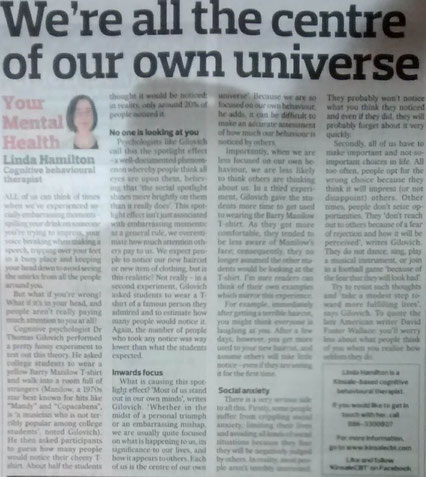
Last week's Southern Star column examined the 'spotlight effect' - the tendency of people to think all eyes are upon them, even when others may be paying little or no attention. The column is reproduced below.
All of can think of times when we’ve experienced socially embarrassing moments – spilling your drink on someone you’re trying to impress, your voice breaking when making a speech, tripping over your feet in a busy place and keeping your head down to avoid seeing the smirks from all the people around you. But what if you’re wrong? What if it’s in your head, and people aren’t really paying much attention to you at all?
Cognitive psychologist Dr Thomas Gilovich performed a pretty funny experiment to test out this theory. He asked college students to wear a yellow Barry Manilow T-shirt and walk into a room full of strangers (Manilow, a 1970s star best known for hits like “Mandy” and “Copacabana”, is ‘a musician who is not terribly popular among college students’, noted Gilovich). He then asked participants to guess how many people would notice their cheesy T-shirt. About half the students thought it would be noticed; in reality, only around 20 per cent of people noticed it.
Psychologists like Gilovich call this the spotlight effect – a well-documented phenomenon whereby people think all eyes are upon them, believing that ‘the social spotlight shines more brightly on them than it really does’. This spotlight effect isn’t just associated with embarrassing moments: as a general rule, we overestimate how much attention others pay to us. We expect people to notice our new haircut or new item of clothing, but is this realistic? Not really – in a second experiment, Gilovich asked students to wear a T-shirt of a famous person they admired and to estimate how many people would notice it. Again, the number of people who took any notice was way lower than what the students expected (continued below...)
CAUSE OF SPOTLIGHT EFFECT
What is causing this spotlight effect? ‘Most of us stand out in our own minds’, writes Gilovich. ‘Whether in the midst of a personal triumph or an embarrassing mishap, we are usually quite focused on what is happening to us, its significance to our lives, and how it appears to others. Each of us is the centre of our own universe’. Because we are so focused on our own behaviour, he adds, it can be difficult to make an accurate assessment of how much our behaviour is noticed by others.
Importantly, when we are less focused on our own behaviour, we are less likely to think others are thinking about us. In a third experiment, Gilovich gave the students more time to get used to wearing the Barry Manilow T-shirt. As they got more comfortable, they tended to be less aware of Manilow’s face; consequently, they no longer assumed the other students would be looking at the T-shirt. I’m sure readers can think of their own examples which mirror this experience. For example, immediately after getting a terrible haircut, you might think everyone is laughing at you. After a few days, however, you get more used to your new haircut, and assume others will take little notice – even if they are seeing it for the first time.
SOCIAL ANXIETY
There is a very serious side to all this. Firstly, some people suffer from crippling social anxiety, limiting their lives and avoiding all kinds of social situations because they fear they will be negatively judged by others. In reality, most people aren’t terribly interested. They probably won’t notice what you think they noticed and even if they did, they will probably forget about it very quickly.
Secondly, all of us have to make important and not-so-important choices in life. All too often, people opt for the wrong choice because they think it will impress (or not disappoint) others. Other times, people don’t seize opportunities. They ‘don’t reach out to others because of a fear of rejection and how it will be perceived’, writes Gilovich. They do not dance, sing, play a musical instrument, or join in a football game ‘because of the fear that they will look bad’.
Try to resist such thoughts and ‘take a modest step toward more fulfilling lives’, says Gilovich. To quote the late American writer David Foster Wallace: you’ll worry less about what people think of you when you realise how seldom they do.